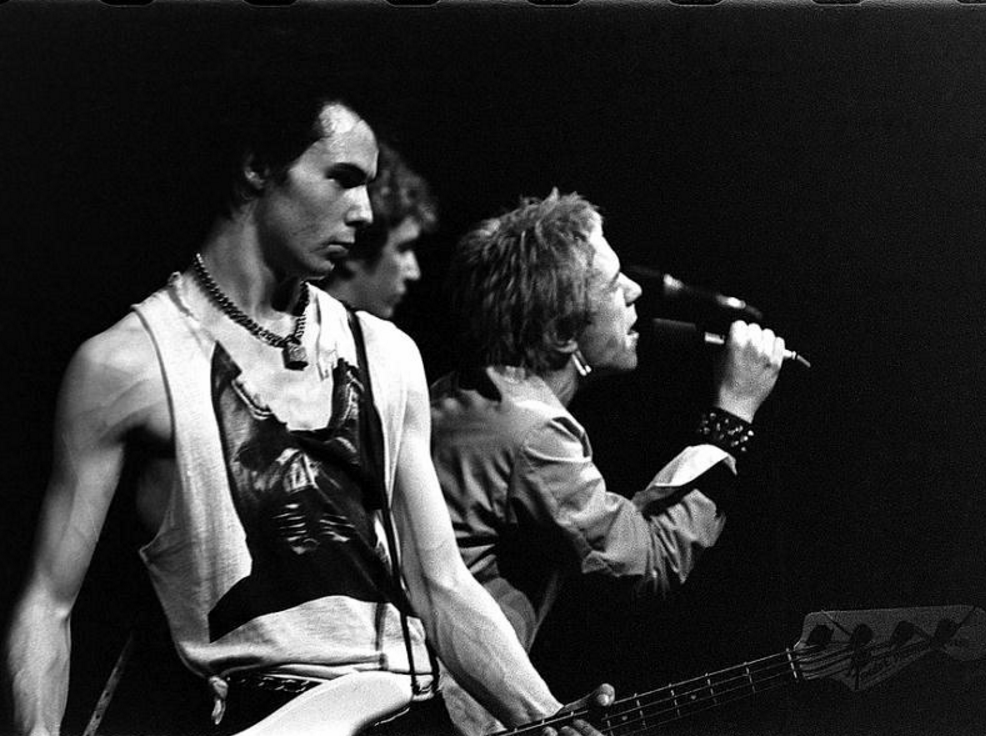 The Pistols’ manager Malcolm McLaren could have debuted his band at a place like New York’s grungy CBGBs, where they would have been welcomed by the type of rock fans and music writers already accustomed to punk acts like The Ramones, The Dead Boys, and other raw, edgy artists. But McLaren, a visual artist, clothing designer and boutique owner with scant music industry experience, always chose controversy over convention. His strategy was to book the Pistols into small clubs in the types of U.S. cities where he reckoned fans of traditional FM-radio rock were bound to dislike the profane, mocking punks. The more bottles, beer cans, bar food, and mucous hurled at the band, the better. The crucial figure in this scenario was McLaren’s pet Pistol John Simon Ritchie, a somewhat shy, polite boy who devolved into the stage menace known as Sid Vicious when he joined the group as a replacement bass player in early 1977 (it’s rumored he learned to play the instrument during one all-night practice marathon). Singer Johnny Rotten (John Lydon) was a sneering, flailing, wild-eyed frontman in the style of a performance artist. His bark was worse than his bite. Lead guitarist Steve Jones and drummer Paul Cook were competent musicians who wanted to be taken seriously. But it was the heroin-fueled, ready-to-rumble Sid that McLaren would count on to generate headlines and earn them all a place in rock history.
The Pistols’ manager Malcolm McLaren could have debuted his band at a place like New York’s grungy CBGBs, where they would have been welcomed by the type of rock fans and music writers already accustomed to punk acts like The Ramones, The Dead Boys, and other raw, edgy artists. But McLaren, a visual artist, clothing designer and boutique owner with scant music industry experience, always chose controversy over convention. His strategy was to book the Pistols into small clubs in the types of U.S. cities where he reckoned fans of traditional FM-radio rock were bound to dislike the profane, mocking punks. The more bottles, beer cans, bar food, and mucous hurled at the band, the better. The crucial figure in this scenario was McLaren’s pet Pistol John Simon Ritchie, a somewhat shy, polite boy who devolved into the stage menace known as Sid Vicious when he joined the group as a replacement bass player in early 1977 (it’s rumored he learned to play the instrument during one all-night practice marathon). Singer Johnny Rotten (John Lydon) was a sneering, flailing, wild-eyed frontman in the style of a performance artist. His bark was worse than his bite. Lead guitarist Steve Jones and drummer Paul Cook were competent musicians who wanted to be taken seriously. But it was the heroin-fueled, ready-to-rumble Sid that McLaren would count on to generate headlines and earn them all a place in rock history.
In John Savage’s excellent book England’s Dreaming: Anarchy, Sex Pistols, Punk Rock and Beyond, he explains: “The Sex Pistols were to swing through the Deep South that McLaren found so romantic in early 1975. There they would be playing to ‘real people’ in a situation that would ensure fresh confrontation.” In short, he wanted to shake people out of their long, monotonous classic-rock comas, and he had just the right cast of characters to carry out his mission.
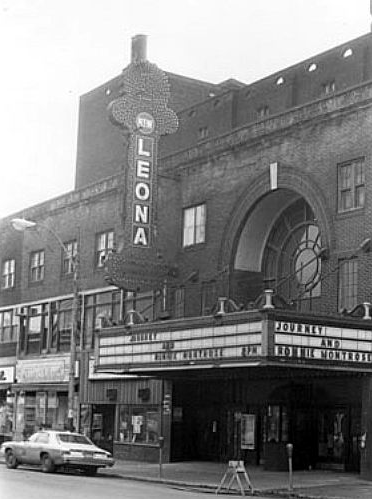 Why McLaren chose Homestead, PA, as the place to unleash his Sex Pistols on U.S. soil is anybody’s guess. As a Pittsburgher, I assure you that our region, north of the Mason-Dixon line, is far from the Deep South and hardly the type of area too conservative to turn away a provocative act. (Wild-child Iggy played here in March 1977, with David Bowie in his backup band.) Maybe Pittsburgh’s industrial reputation pegged it as dull, out-of-step, and rife with blue-collar, shot-and-a-beer head-bangers. Or maybe McLaren found an open venue that fit his schedule and booked it, plain and simple. But, the venue he chose was anything but plain and simple. The Leona Theater, on the main drag of the bustling steel town, opened in 1925 as Stahl’s Million Dollar Theater. For generations it offered a grand setting for first run movies, vaudeville performances, early doo-wop and rock-n-roll revues, jazz concerts, folk and country performances, dance marathons, and boxing matches. In 1974 it was renamed the New Leona Concert Hall and became a popular venue for such up-and-coming artists as Elvis Costello, Blondie, Meatloaf, the aforementioned Iggy Pop, Southside Johnny and the Asbury Jukes, and Patti Smith, who would be the last person to perform there — in July 1978 (Pittsburgh’s Iron City Houserockers opened for her). The rowdy Pistols and their fans might have done some damage to the place, but it would have made little difference at that time. Within a few years Homestead would be ranked as one of the most economically distressed cities in America, and the theater would be demolished.
Why McLaren chose Homestead, PA, as the place to unleash his Sex Pistols on U.S. soil is anybody’s guess. As a Pittsburgher, I assure you that our region, north of the Mason-Dixon line, is far from the Deep South and hardly the type of area too conservative to turn away a provocative act. (Wild-child Iggy played here in March 1977, with David Bowie in his backup band.) Maybe Pittsburgh’s industrial reputation pegged it as dull, out-of-step, and rife with blue-collar, shot-and-a-beer head-bangers. Or maybe McLaren found an open venue that fit his schedule and booked it, plain and simple. But, the venue he chose was anything but plain and simple. The Leona Theater, on the main drag of the bustling steel town, opened in 1925 as Stahl’s Million Dollar Theater. For generations it offered a grand setting for first run movies, vaudeville performances, early doo-wop and rock-n-roll revues, jazz concerts, folk and country performances, dance marathons, and boxing matches. In 1974 it was renamed the New Leona Concert Hall and became a popular venue for such up-and-coming artists as Elvis Costello, Blondie, Meatloaf, the aforementioned Iggy Pop, Southside Johnny and the Asbury Jukes, and Patti Smith, who would be the last person to perform there — in July 1978 (Pittsburgh’s Iron City Houserockers opened for her). The rowdy Pistols and their fans might have done some damage to the place, but it would have made little difference at that time. Within a few years Homestead would be ranked as one of the most economically distressed cities in America, and the theater would be demolished.
But back to the tour. Plans began to go awry right from the start when authorities refused to issue visas to several band members with criminal records. This threatened to delay their departure from the U.K. Pittsburghers hoping to have the distinction of being the first Americans to witness the notorious Sex Pistols – on December 28, 1977 – started fearing the worst when concert promoter Danny Kresky Enterprises issued a second set of tickets stamped with December 29. Soon, the Leona Theater marquee was advertising a December 30 show.
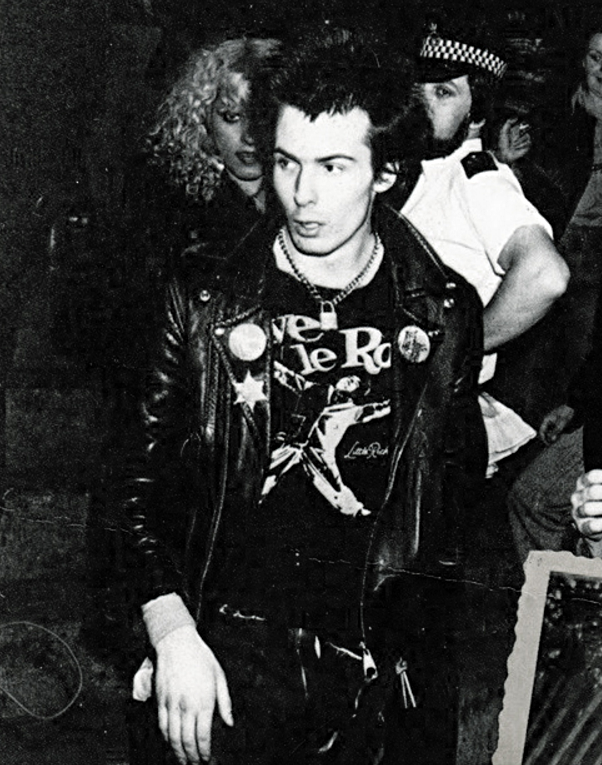 In the end, the visa delay caused the Pistols to cancel the Pittsburgh concert and the following shows in Cleveland, Chicago, and Alexandria, Virginia. The two-week 1978 tour would kick off with a lackluster performance in Atlanta, and move on to Memphis, San Antonio, Baton Rouge, Tulsa, and Dallas (where Sid appeared on stage with the words “Gimme a fix” carved into his chest with a razor blade.) The entire tour was plagued by problems stemming from the band members’ infighting, their frustrations with an absentee McLaren, altercations with audiences, and Sid’s increasing drug use. They closed their tour at San Francisco’s Winterland Ballroom on January 14, with Johnny Rotten’s final words onstage as a Sex Pistol: “Ever get the feeling you’ve been cheated?” He quit the band the following day. After a tumultuous two-and-a-half-year run, The Pistols were now smoking guns; their impact as rock innovators and punk style icons would prove to be significant.
In the end, the visa delay caused the Pistols to cancel the Pittsburgh concert and the following shows in Cleveland, Chicago, and Alexandria, Virginia. The two-week 1978 tour would kick off with a lackluster performance in Atlanta, and move on to Memphis, San Antonio, Baton Rouge, Tulsa, and Dallas (where Sid appeared on stage with the words “Gimme a fix” carved into his chest with a razor blade.) The entire tour was plagued by problems stemming from the band members’ infighting, their frustrations with an absentee McLaren, altercations with audiences, and Sid’s increasing drug use. They closed their tour at San Francisco’s Winterland Ballroom on January 14, with Johnny Rotten’s final words onstage as a Sex Pistol: “Ever get the feeling you’ve been cheated?” He quit the band the following day. After a tumultuous two-and-a-half-year run, The Pistols were now smoking guns; their impact as rock innovators and punk style icons would prove to be significant.
Within a year of the breakup Johnny Rotten reverted back to John Lydon and formed Public Image Ltd. (PiL). He still tours with the band, has hosted or appeared as a guest on numerous TV shows, wrote two memoirs, and has become an eccentric celebrity of sorts. Steve Jones and Paul Cook have enjoyed decades of success in the music business, touring and recording with various artists.
But it’s Sid who will forever be the poster boy of punk, based on nothing more than bravado, a carefully crafted appearance, and the fact that he overdosed on heroin supplied by his own mother after allegedly killing Nancy Spungen with a hunting knife at the Chelsea Hotel in October 1978. He was 21. His druggy paramour was 20. Death…it’s a great career move.
Looking back, I think the Sex Pistols would have loved Homestead. They would have felt right at home in the midst of the encroaching urban decay so reminiscent of the London streets from whence they came…the same streets that spawned a generation of disenfranchised English kids who found an outlet and identity through punk music and fashion.
Here’s a look at The Pistols, in all their filth and fury. This footage was shot at Randy’s Rodeo in San Antonio, Texas, on January 8, 1978.
© Dana Spiardi, December 29, 2015
]]>
My dad always had our kitchen radio tuned to 1020 on the dial. There was no fighting him on that; he loved his KD. I still have the Westinghouse radio, circa 1960, pictured above, and it still plays! Daddy worked at Westinghouse back in the days when the one-time industrial giant made consumer electronics and appliances, so he bought it with his company discount.
When a plain-talking Montana native named Jack Bogut joined KDKA in 1968 he quickly became the most popular morning announcer in town, with his silly stories about things called farkelberries and snickerdoodles and his recitations of Shel Silverstein’s “Slitheree Dee.” One day he said he had received a call from an angry listener, complaining about the “dumb Polack” jokes he used to tell. He then revealed he had Polish roots, which made the locals seem to like him that much more.
He didn’t play much music — mostly lightweight stuff and novelty songs, which Daddy loved. One song I clearly remember was “Tennessee Bird Walk,” with goofy lyrics like you can see them walking southward in their dirty underwear. Bogut thought it was hilarious and played it as often as he could. This one’s for you, Daddio:
Now, here’s a little clip featuring some of KDKA’s jingles. Remember these? Oh, we Pittsburghers are so nostalgic.
© Dana Spiardi, Nov 2, 2015
]]>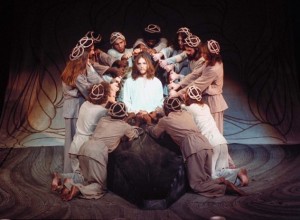 The first staged production of the musical didn’t occur until after the British songwriting duo released the controversial 2-disc concept LP in the U.K. in 1970. While Rice and Webber struggled to obtain financing to launch their own theatrical production of the last days of Christ, unlicensed versions of the musical started popping up in the United States, where the album was wildly received. The first live performance took place in June 1971, staged by high school students in Southold, New York. But this performance, like hundreds of others to follow, was unauthorized, and the play’s writers filed lawsuits to shut them all down. So, Pittsburgh had the honor of hosting the very first sanctioned version of the rock opera. A crowd of 13,000 people turned out to see the play at the city’s domed, space-age Civic Arena, the world’s first major sports/entertainment venue to feature a retractable roof (it was demolished in 2012).
The first staged production of the musical didn’t occur until after the British songwriting duo released the controversial 2-disc concept LP in the U.K. in 1970. While Rice and Webber struggled to obtain financing to launch their own theatrical production of the last days of Christ, unlicensed versions of the musical started popping up in the United States, where the album was wildly received. The first live performance took place in June 1971, staged by high school students in Southold, New York. But this performance, like hundreds of others to follow, was unauthorized, and the play’s writers filed lawsuits to shut them all down. So, Pittsburgh had the honor of hosting the very first sanctioned version of the rock opera. A crowd of 13,000 people turned out to see the play at the city’s domed, space-age Civic Arena, the world’s first major sports/entertainment venue to feature a retractable roof (it was demolished in 2012).
The now-legendary opera finally opened on Broadway on October 12, 1971, to mixed reviews and closed on June 30, 1973, after 711 performances. The musical then got the Hollywood treatment in 1973, when it was adapted into a movie directed by Norman Jewison and starring Ted Neeley and Carl Anderson. After having listened to the original British recording hundreds of times, bowled over by the singing of Ian Gillan (former lead singer of Deep Purple) as Jesus and Murray Head as Judas, I never warmed to the vocal performances of the film’s stars or of subsequent stage actors. (Listen to this clip of Ian Gillan’s voice, and compare it to the vocal in the video below.) All said, the music and lyrics are phenomenal, no matter who wears the robe.
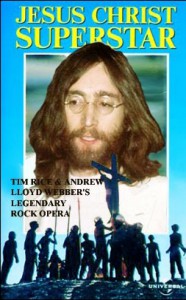
While we’re on the subject of superstars – celestial and otherwise – here are a few interesting casting facts. It’s been said that Rice and Webber had John Lennon in mind as they wrote their musical. In 1969 John was offered the role of Jesus, but turned it down. Was it because the authors wouldn’t grant John’s supposed request to cast Yoko as Mary Magdalene, or because he was still recovering from the backlash over his “Beatles are bigger than Christ” remark in 1966? No one knows for sure. When producers began casting the film version, Mick Jagger, Mr. “Sympathy for the Devil” himself, was the top choice to play Jesus, but also declined. Next on the list was TV teen idol David Cassidy, who would have made a very pretty, but vocally weak Jesus. Personally, I’d like to have seen what David Bowie would have done with the role!
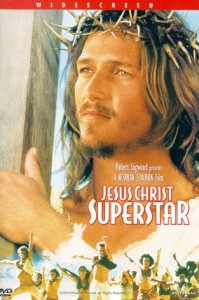
In the end, however, the film part went to Ted Neeley, who was Jeff Fenholt’s understudy during the first Broadway run. Ted’s very wired performance elicited some interesting reviews. Newsweek‘s Paul D. Zimmerman said Neeley’s “Jesus often recalls Charles Manson.” Bruce Williamson of Playboy said that Neeley’s “portrayal of Christ ought to fix him permanently in public memory as the Screamin’ Jesus.”
Director Norman Jewison could be partly to blame for Neeley’s theatrics. Talk about “screamin’ Jesus!” Here, a screamin’ Jewison gushes about his very beautiful film in a very beautiful interview in Playboy magazine:
“We made it into a spiritual experience and it’s beautiful, and Jesus is beautiful, the kids are beautiful, it’s going to be a beautiful film. People are going to see it in drive-ins and neighborhood ‘nowhere’ theaters and they’re going to be moved by it. People who were never moved by this story before. People who always thought that Jesus Christ was some kind of schmuck. They’re going to see something beautiful and they’re going to cry. They won’t be able to help themselves. When you really come to think of it, we’re doing Him a favor.”
Ah, don’t ya just love Hollywood?
Here’s a scene from the JC Superstar movie:
© Dana Spiardi, Feb 20, 2014
]]>
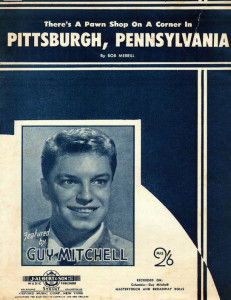 “There’s a pawn shop on the corner in Pittsburgh, Pennsyl-vay-nee-a, and I ain’t got a thing left to hock.” My mom used to sing those words to me all the time when I was a little kid. They’re from the song “Pittsburgh, Pennsylvania,” one of many odd little long-forgotten ditties Mom entertained me with. She most likely overheard these tunes being played on the jukebox of her dad’s family-style tavern, which was located in a small village 35 miles east of Pittsburgh called Cokeville, PA. That’s a picture of her below, standing next to that old Wurlitzer. She grew up with music, and always loved it as much as I do.
“There’s a pawn shop on the corner in Pittsburgh, Pennsyl-vay-nee-a, and I ain’t got a thing left to hock.” My mom used to sing those words to me all the time when I was a little kid. They’re from the song “Pittsburgh, Pennsylvania,” one of many odd little long-forgotten ditties Mom entertained me with. She most likely overheard these tunes being played on the jukebox of her dad’s family-style tavern, which was located in a small village 35 miles east of Pittsburgh called Cokeville, PA. That’s a picture of her below, standing next to that old Wurlitzer. She grew up with music, and always loved it as much as I do.
The Pawn Shop song was written by Bob Merrill and released in 1952 by a singer/actor named Guy Mitchell, who was born on this date in 1927 (he passed away in 1999).
Mommy still remembers all the lines. I especially like hearing her sing this one:
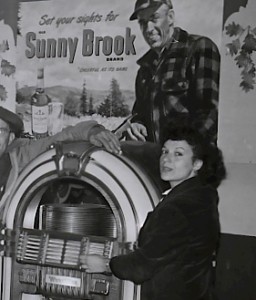 If you should run into a golden-haired angel
If you should run into a golden-haired angel
And ask her tonight for a date,
She’ll tell you somewhere there’s a rich millionaire
Who is calling again about eight.
Guy Mitchell was quite popular in the U.K. In fact, any time I travel there, someone invariably asks me about the Pawn Shop song when I tell them I’m from Pittsburgh. A craftsman at the Waterford crystal factory in Ireland even asked me to sing it for him. And I did, much to the chagrin of my husband Ed. Well, I got a round of applause from the glass maker and a few of his co-workers, anyway.
Thanks, Mommy, for teaching me sweet little songs like this. These tunes may sound corny today, but they’re all part of that eclectic musical stew that made yer blogger the pop/rock-aholic she is today.
Now, here’s birthday boy Guy Mitchell singing his Pawn Shop song. The video features many interesting old scenes of Pittsburgh, including the old Forbes Field baseball park, the steel mills, and West View Park’s Danceland (where the Rolling Stones performed in 1964!). There is a reference to “the clock,” which we Pittsburghers all know is the one that’s still on the corner of the old Kaufmann’s Department Store building. “Meet me under the Kaufmann’s clock” was a common Pittsburgh saying. By the way, this song is typical of the old “dancehall” style enjoyed in England by many Brits in that tame era before The Beatles!
© Dana Spiardi, Feb 22, 2015
]]>